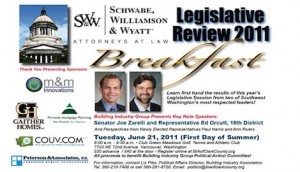 The Building Industry Group brought together Washington state legislators Sen. Joe Zarelli (R-Ridgefield), Rep. Ed Orcutt (R-Kalama), and freshman representatives Ann Rivers (R-La Center) and Paul Harris (R-Vancouver) to share their views on the recently completed legislative session.
The Building Industry Group brought together Washington state legislators Sen. Joe Zarelli (R-Ridgefield), Rep. Ed Orcutt (R-Kalama), and freshman representatives Ann Rivers (R-La Center) and Paul Harris (R-Vancouver) to share their views on the recently completed legislative session.
The crowd responded with enthusiastic applause when Zarelli shared his vision that the state shouldn’t spend more money than it has coming in. He spoke about forced savings for the legislature, halting overspending during windfall years, and criticized rewarding school districts for their ESL (English as a Second Language) program failures – noting the goal should be to move students into mainstream classes.
Orcutt sought to dissipate the notion of a centrist “Roadkill Caucus” made up of state Democratic legislators who hold less traditional Democratic views and who often side with Republican colleagues. Answering an audience member’s inquiry he said, “Know [that] it doesn’t exist.”
Applause for Orcutt came when he said, “It’s not government that creates wealth in this state – it’s you.” He identified issues with the Department of Energy, an agency he says is overpopulated with rule makers who make it harder to bring prosperity to the state. After reporting about one employee earns $80,000 a year plus benefits, he suggested cuts in the agency, saying while they wouldn’t make a significant difference in the overall state budget they could have a significant impact on business.
Orcutt also talked about a bill he supported that would alter how liens function. The current lien process tags all assets and makes it impossible for a contractor to get bonded and insured to actually work. If a contractor can’t work, then he or she can’t pay off back taxes. Orcutt’s bill gives the option of placing a limited lien on a specific piece of property – not all assets – which allows a contractor to continue to work and pay taxes.
Rivers said that education is a priority for the legislature and will be a priority in the future. She noted that she was the only incoming freshman to get a bill passed during the legislative session. Harris, the other freshman in attendance, summed up his experience by saying, “We need a majority. We need people who think.”
During the question period, the elected officials were asked to identify how they would hold the Columbia River Crossing project accountable. Rivers said she already asked CRC Director Nancy Boyd for a complete audit of the project. Rivers reported she received a response from Boyd that “they are doing it.” Harris added that the audit should be done by a third party, not associated with the state and not associated with the project.
Orcutt said the project may or may not be built, but either way there is “no faith or trust in the process.” Orcutt surprised those who had attended the June 4 “Bridging the Gaps” event when he confessed he had not followed through on the promise he made that day [comment at 05:10] to, “call the state auditor and perhaps even the state attorney general to look into what’s going on with the CRC.” At Tuesday’s event, he noted he had been busy, but would make that call “today.”
In the interest of full disclosure, COUV.COM was a named sponsor of the event.









